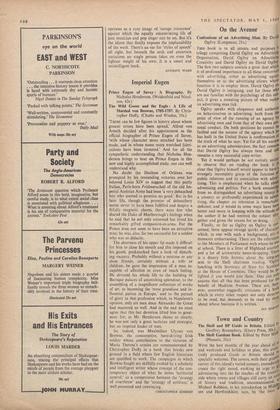On the Avenue
Tins book is to all intents and purposes 9 trilogy comprising David Ogilvy on Advertising Organisation, David Ogilvy on Advertising Creativity and David Ogilvy on David Ogilvy. The first two subjects contain a great deal ,which is of profound importance to all those concerned with advertising, either as advertising agents themselves or as the advertising clients whose function it is, to employ them. David Ogilvy on David Ogilvy is intriguing, and for those who are not familiar with the psychology of this sulr ject, it gives a revealing picture of what makes an advertising man tick.
Ogilvy speaks with eloquence and authoritY on behaviourism in advertising, both from the point of view of the running of an agency 13)1 advertising men and from that of their own Pee' sonal conduct. On both positions he cannot be faulted and the success of the agency which be has built in the United States is confirmation of the truth of what he says. Yet for all his success as an advertising administrator, the fact remain! that David Ogilvy has always been and still remains a very successful copy-writer. Yet it would perhaps be not entirely unfa!r to observe that on reading the book it 15 clear that Ogilvy himself would appear to have a, strangely incomplete grasp of the function 1. public relations and its association with adver, tising. This is emphasised when he talks about advertising and politics, For a book emanating from so, distinguished an advertising source t° a country so profoundly experienced in adver" tising, the chapter on television is remarkably deficient and it would in some ways have been better and more in keeping with the attitude f the author if he had omitted the subject altir gether and given the reason for so doing. Finally, so far as Ogilvy on Ogilvy is COo' cerned, there appear strange quirks of character, which, in one with such a background, are s' moments embarrassing. There are the reference to the Members of Parliament with whom he vvt5 at school. There is a litter of Highland ancestry and a lot of aristocratic name-dropping. There is a dreary little histoire about the telegrar°, sent to the Shell chairman reading. '051 lunching with Secretary of State for Scotland at the House of Commons. They would be a,e,, lighted if you would join them.' One can °II; assume that all this has been produced for 17 benefit of Madison Avenue. These are, 11°W ever, somewhat niggardly criticisms of a b°c'is which in every other respect not only deseryee to be read, but demands to be read by 111°s about whose business it is written. IAN HARV°














































 Previous page
Previous page